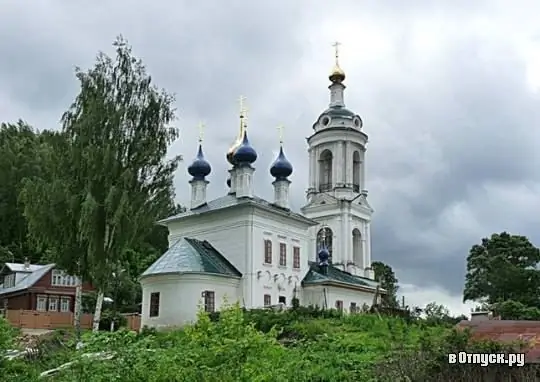
Description of the attraction
At the end of the 17th - beginning of the 18th centuries, a wooden church of the Holy Great Martyr Barbara appeared in Plyos near the Volga. In 1821 the building became white-stone. The street on which this temple stands, like many other streets of the city, bears two names: Varvarinskaya and Uritskogo. Levitan, inspired by the picturesque view of the Russian River and the Varvara Church, painted one of his most famous canvases, The Golden Plyos.
Since then, little has changed in the appearance of the church. Unlike the rich decoration of the bell tower, the church of the Holy Great Martyr Barbara is laconic and simple. Art critics call the style of the church classicism. A two-story quadrangle with a four-pitched roof completes the five-dome. Intercept domes are located far apart on narrow faceted drums. After restoration, the central dome of the main volume and the bell tower dome became gilded. The apse is slightly elongated along the axis passing through all the buildings. Thus, the altar part takes the form of a narrowed semi-oval. The refectory, on the other hand, is stretched and protrudes on both sides of the main volume. Its gable roof has two small domes at the edges. The corners of the quadrangle and the refectory are rounded. Rectangular windows of the second tier are enclosed in simple frame platbands with sandrids. Window openings of the lower tier without platbands, provided only with cornices and window ledges. The space between the tiers of the quadrangle is decorated with arched niches.
The bell tower was probably built later than the church itself, since it is distinguished by its design in the style of mature classicism. It consists of three tiers. The lower tiers are two fours, standing on top of each other, and the ringing of a cylindrical shape, ending with a dome with lucarnes on four sides and a cupola, matches the church one. High arched openings are repeated on each tier of the slender bell tower. The pediments and the columns supporting them emphasize the aspiration upward.
The interior of the temple has preserved the old glue painting of the mid-19th century, executed in the spirit of classicism with baroque elements using the grisaille technique. The Gospel compositions are located on the vault on its four sides: "Nailing to the Cross" (western), "Carrying the Cross" (southern), "Entombment" (northern) and "Resurrection" (southern). Church attributes are depicted above the upper light tier. In the middle tier, the large figures of the saints contrast with the small characters of the plot biblical compositions. The ornament framing the paintings from the life of Christ is made in the Baroque style.
The Church of St. Barbara the Great Martyr is the hallmark of the Volga town. You can find it on almost all Plyos souvenir products: on postcards, magnets, key chains, dishes, etc. It is still valid now. The service is held here on weekends and holidays.






